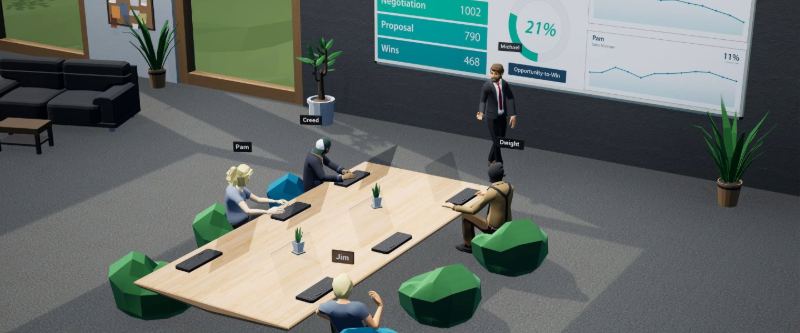
Why your personal brand matters
How people engage with you is shaped by your brand. If you are known to be reasonable, pragmatic, and strategic, they will want to work with or for you. But if you...

by Ann-Christin Andersen , Achim Plueckebaum, Michael R. Wade, Anja Lagodny, Corinne Avelines Published October 4, 2024 in Brain Circuits • 3 min read
Your organization is in the early stages of working with AI. You are aware of the technology but are doing little with it. This is Stage 1, when hiring a CAIO is unlikely to benefit you – and may even do more harm than good through lack of integration across departments and functions, and duplication of effort.
You are actively experimenting with AI, but in a fragmented manner with multiple initiatives spread across the organization. As these experiments become more numerous and mature, gaps and overlaps should become apparent and the need for a CAIO grows, but it should primarily be to capture and map AI activities to ensure visibility around what is being done.
The periods in which a CAIO can provide the most benefit are stages 3 and 4. In Stage 3, they can guide the process whereby AI initiatives move from experiments to selective implementation. Critically, the CAIO needs to prepare the groundwork for widespread integration of AI across the organization.
In Stage 4, as integration starts to scale throughout the organization, the CAIO role is still potentially beneficial; not least because scaling AI initiatives inevitably means canceling many local projects and replacing them with enterprise-wide AI solutions. And, because these changes will surely encounter local resistance, the political skills of the CAIO will become as important as their operational role.
Once AI has become an accepted way of working across much of the organization, the need for a CAIO diminishes – indeed, it may even be counterproductive to maintain the role. For this reason, the role should not become a permanent position. Rather, it should be a fixed-term appointment with a specific brief to build a set of enterprise AI capabilities that will ultimately be handed over to the business and/or technology organizations.
Do You Really Need a Chief AI Officer?
Experiment to accumulate: How CHROs can build their AI knowledge
When it comes to creativity, AI is a skilled copilot
The right AI for the job: Generative vs. legacy – when to use each
All views expressed herein are those of the author and have been specifically developed and published in accordance with the principles of academic freedom. As such, such views are not necessarily held or endorsed by TONOMUS or its affiliates.

Ann-Christin Andersen is an executive with 35 years of experience in the energy industry. She has held executive and senior management positions at Shell, ABB, Kongsberg Ground, and FMC Technologies. Today, Andersen is CEO of Norwegian Energy Partners. She combines her executive role with strategic advisory through her start-up 4ADA and non-executive board work in the UK, Denmark, and Norway. She holds a bachelor’s degree with 1st Class Honors in Offshore Electrical Engineering from Heriot-Watt University, UK, and an Executive MBA with Honors from IMD.


Professor of Strategy and Digital
Michael R Wade is Professor of Strategy and Digital at IMD and Director of the Global Center for Digital and AI Transformation. He directs a number of open programs such as Leading Digital and AI Transformation, Digital Transformation for Boards, Leading Digital Execution, Digital Transformation Sprint, Digital Transformation in Practice, Business Creativity and Innovation Sprint. He has written 10 books, hundreds of articles, and hosted popular management podcasts including Mike & Amit Talk Tech. In 2021, he was inducted into the Swiss Digital Shapers Hall of Fame.

Executive in Residence at IMD and Senior Executive at Anja Lagodny Consulting
Anja Lagodny is a senior business and technology leader who has successfully and passionately driven the digital and growth agenda within various major global CPG and technology companies in different locations worldwide. She is also Chair of the International Chapter of the Swiss Institute of Directors.

CEO of SIBIUS and IMD Executive In Residence
Corinne Avelines has been CDO at global navigation company TomTom, leading coffee and tea business JDE, and paint and coatings multinational AkzoNobel. She is now a healthtech entrepreneur with SIBIUS, and a non-executive director with Transdev NL (public transport) and Spadel (Euronext Brussels SPA, bottled waters).

10 hours ago • by Cindy Wolpert in Brain Circuits
How people engage with you is shaped by your brand. If you are known to be reasonable, pragmatic, and strategic, they will want to work with or for you. But if you...

February 17, 2026 • by Stefan Michel in Brain Circuits
Many of us still equate gaming with dudes playing video games like Grand Theft Auto in a basement. In fact, as Bastian Bergmann told Stefan Michel in a recent I by IMD Book...

February 12, 2026 • by Francesca-Giulia Mereu in Brain Circuits
Beige gets a bad rap from brand consultants, but when you’re stressed, it’s hard to think clearly: you need to return to neutral first. To reset your nervous system, try going back...

February 11, 2026 • by Stefan Michel in Brain Circuits
Drawing on his recent IMD podcast with Amar Bhidé, IMD Professor of Management Stefan Michel debunks longstanding misconceptions about entrepreneurship....
Explore first person business intelligence from top minds curated for a global executive audience